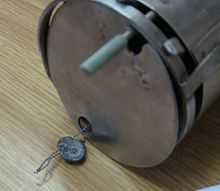Puah Institute
 | |
| Founded | 1990 |
|---|---|
| Founder(s) | R' Menachem Burstein[1] |
| Headquarters | |
| Area served | Global |
| Focus(es) | Fertility medicine, Gynecology, Jewish law, Education |
| Method(s) | Free fertility consultations for couples |
| Motto | The Leading Jewish Fertility organization |
| Website | puahonline.org |
The PUAH Institute (Hebrew: מכון פועה Machon Puah) is an Israel-based, international organization that works with Jewish couples with fertility problems . PUAH was founded in 1990 at the request of Rabbi Mordechai Eliyahu to bridge the gap between fertility treatment and Jewish law.
The institute offers counseling services and technical support for couples dealing with infertility.
Background
IVF and related treatments at their outset in the 1980s were viewed with great skepticism by the religious communities. The Roman Catholic Church opposes all kinds of in vitro fertilization because, as with contraception, it separates the procreation purpose of the marriage act from its unitive purpose. The Islamic community, after the fatwa regarding Assisted reproductive technology (ART) by Gad El-Hak Ali Gad El-Hak of Egypt's Al-Azhar University, largely accepted ART.[2]
Within the Orthodox Jewish community the concept was debated. In general, traditional Judaism views medical intervention positively. Regarding ART, the positive view of medicine is challenged by the Jewish religious legal system (halacha) which has numerous laws regarding modesty, sexuality and verifiable lineage.
Rabbi Menachem Burstein was requested by Rabbi Mordechai Eliyahu to create a framework to assist couples in navigating the medical options while remaining within Jewish halacha.[3]
Services
The institute receives over 180 calls a day and services over 40,000 couples each year.[4][5]
Counseling Services
Puah works with couples both by reviewing medical records and advising as to specific doctors and by finding solutions to problems of Jewish law raised by treatment procedures. Common problems in ART and halacha include sperm sampling and banking, fertility treatments on Shabbat and surrogacy.
Supervision Services

Due to fear of both human error[6][7] and intentional deception (as in the case of Cecil Jacobson) the majority of orthodox rabbis have ruled that Jewish law requires an outside supervisor present to monitor the procedure and storage of the genetic material. An orthodox man or women must oversee all aspects of the in vitro fertilization (IVF) process, including sample washing, centrifugation, freezing and loading of pipettes.[8]
If the clinic can spare it, the lab will have a dedicated incubator or storage tanks for the Puah-supervised couples. That particular incubator, unlike those containing the reproductive material of non-supervised couples, is locked with a latch and key. The Puah supervisor is the only person with a key.
An alternative is a stainless steel case with dime sized holes in it, known as a Puanite box. The material is placed inside the container, which is then locked with a plastic or metal tie embossed seal with the supervising organization's insignia and placed on one of the incubator shelves. The case can only be opened by snipping the tie.[9]
Puah Institute provides these supervision services in Israel, Europe, Australia, South Africa, South America, the United States and Canada.
Educational Programs
The interplay between traditional Jewish law and modern medicine has created many challenges for the Jewish community. Over the past 30 years many people and organizations have worked to bridge this gap. Puah's educational department works to educate medical professionals to better understand the religious lifestyle and restrictions of the Orthodox Jewish patient and to educate Rabbis to understand the medical challenges and options confronting their congregants.
In January 2010, Puah launched JewishFertility.org, an educational website giving information about the practical applications and interactions of Jewish law and fertility medicine.[10] The web site is presented as a guide for couples experiencing infertility issues.[11]
Professional expertise is also available to the general public through a wide variety of lectures worldwide, training courses and educational news releases. An annual conference is held in Jerusalem each year aimed at the broad public with attendance of over 1500.[12]
See also
- A T.I.M.E.
- Bonei Olam
- Religious response to ART
References
- ↑ Giving Wisely information sheet
- ↑ An article explaining Gad El-Hak Ali Gad El-Hak's ART fatwa
- ↑ L'institut Pouah ouvre une section francophone, Benjamin David, Le JAMIF : Journal de l'Association des médecins israëlites de France, numéro 460, Mai-Juin 1997
- ↑ Snyder, Tamar (February 19, 2010). "Despite Much to Kvetch About, They're Happy". Wall Street Journal. Retrieved 22 February 2010.
- ↑ Puah Institute Fact Sheet, Hebrew press kit
- ↑ "IVF mix-up heads for court". BBC. 2002-07-08. Retrieved 24 May 2009.
- ↑ She was implanted with the wrong embryo, Mike Celizic. TODAYShow.com
- ↑ Siegel-Itzkovich, Judy (May 27, 2007). "Hospital in 'scramble' over fertilized ova mix-up". Jerusalem Post. Retrieved 18 March 2009.
- ↑ Blaze Carlson, Kathryn (May 22, 2009). "How to make a kosher baby". National Post. Canwest News Service. Retrieved May 24, 2009.
- ↑ "Jewish Fertility Online". Torah Tidbits (OU Israel) 893. January 21, 2010.
- ↑ "Jewish Fertility.org". Retrieved 15 February 2010.
- ↑ Consultants in the baby business
External links
- Puah website in English, French and Hebrew.
- Jewish Fertility.org